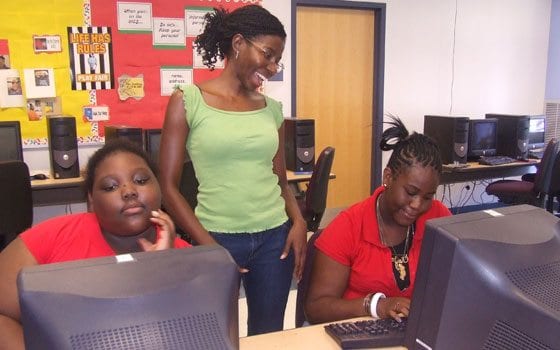
With print newspapers continuing to fall by the wayside, one group of young Bostonians still sees the importance of getting out the written word to the masses.
The Boston Public Health Commission (BPHC) teamed up last year with WriteBoston, a citywide initiative to improve writing proficiency among city youth on the Massachusetts Comprehensive Assessment System (MCAS) tests, to begin publishing Good News, a newspaper written by and for Boston teens about their lives.
WriteBoston Director Betty Southwick said that since the organization’s founding in 2002, the initiative has contributed to marked improvement in the writing skills of students from the nine schools participating in their programming.
WriteBoston-affiliated schools improved 9.9 percentage points in students scoring “advanced” or “proficient,” the top two statistical categories on the English language arts MCAS test, from 37.9 percent in 2006 to 47.8 percent in 2008, according to WriteBoston data. There was also an improvement of 9 percentage points in students who passed the MCAS ELA section, from 83.6 percent in 2006 to 92.6 percent in 2008.
Along with WriteBoston’s online news site Teens in Print (http://www.bostontip.com), the Good News project provides an outlet through which youth can express their concerns on issues in their communities, particularly street violence. Southwick said that the paper is an outlet for a demographic that is often overlooked.
“This initiative has given the students hope about their futures,” she said. “What we find is that if students can find their voice in writing, we can not only see their writing skills improve, but also give them a sense of dignity and respect for themselves.”
Sisters Francesca Durocher, 13, and Taesha Durocher, 14, of Mattapan joined the program because they feared that media outlets were perpetuating an incorrect impression that all young people in their community led criminal lifestyles.
“I wanted to write about violence in my community because I have to deal with it everyday,” Francesca said. “I feel like I am doing something positive with my time by not being in the streets.”
Many of the writing coordinators are community activists and former educators, like Amanda Anderson, who taught in Maine high schools for four years before joining the Good News program. She saw the initiative as an opportunity to help shape the lives of inner-city kids.
“The students have so much to say and they are constantly looking to share their voices,” Anderson said. “It has been a pleasure to learn from them and learn about myself as an educator.”
Not all the paper’s articles are about street violence; many are poignant stories of survival.
Ieysha Smith, 14, of Dorchester wrote a piece about her sister who had a child at 16, her struggles and the impact that a teen pregnancy can have on a family.
“In school, I always wrote about what was on my mind,” she said. “But putting words down on paper and seeing my name in print releases an energy in me that I never thought I had in me before.”
Nicole Daley, the BPHC’s program coordinator on the project, said that when she hears from students like Smith, she believes Good News has accomplished what it set out to do. The program is now looking for more funding to continue during the next school year. So far, parents and students have responded positively to Good News, and Daley said she hopes community leaders will see the importance of the project in the continuing search for answers to the problems of street violence.
“It is about time to have some good news about our communities,” Daley said.
For more information on WriteBoston and the Good News initiative, visit http://www.writeboston.org.






